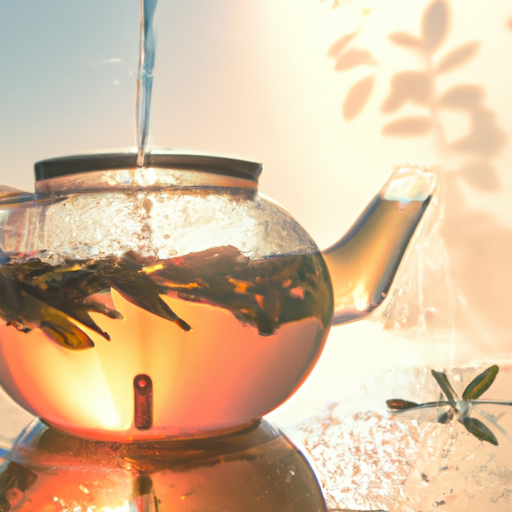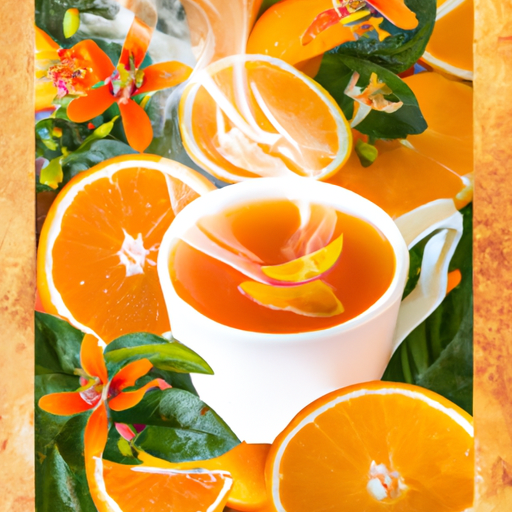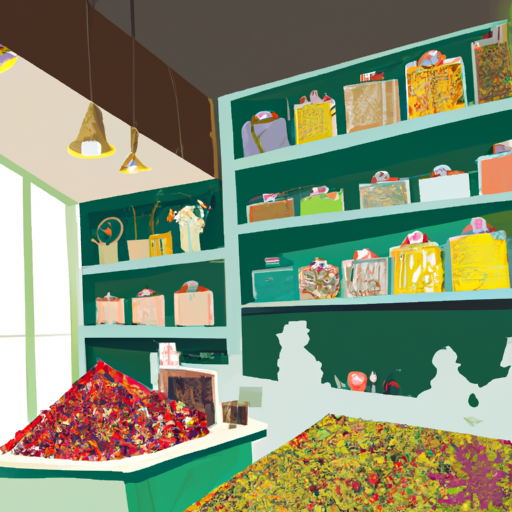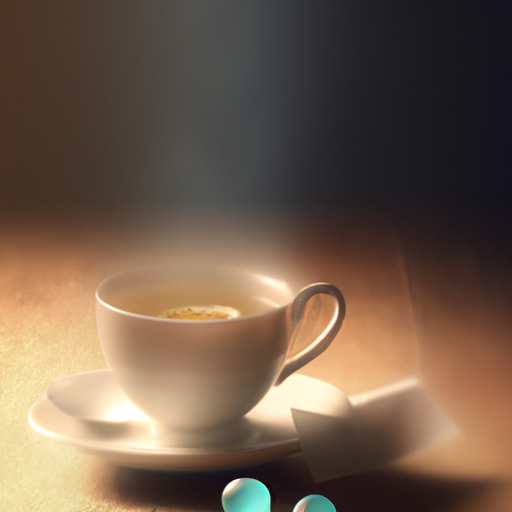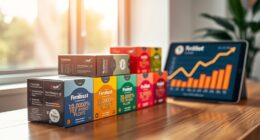Brewing a flawless mug of homemade herbal tea is akin to composing a calming melody for the senses. It’s a delightful fusion of tastes and scents that can whisk you away to a state of peace and calm. As a tea lover, I have dedicated numerous hours to testing out various mixtures and methods in order to craft the perfect cup of herbal bliss.
In this article, I will share with you my tried and true methods for brewing the best cup of herbal tea right in the comfort of your own home. From choosing the right blend to steeping it for the optimal time, I will guide you through each step of the process.
So grab your favorite tea infuser, gather your fresh ingredients, and let’s embark on a journey to tea nirvana together. Get ready to savor the warmth and comfort that only a perfectly brewed cup of homemade herbal tea can provide.
Key Takeaways
- Choosing the right herbal tea blend is crucial for taste and health benefits.
- Properly drying herbs and using high-quality loose tea leaves are important for flavor.
- Boiling water to the perfect temperature is crucial for extracting flavor and benefits.
- Enhancements like honey, stevia, or lemon/orange zest can enhance the tea experience.
Choosing the Right Herbal Tea Blend
To brew the best cup of homemade herbal tea, you need to choose the right herbal tea blend for your taste and desired health benefits. Herbal tea is not only delicious, but it also offers numerous health benefits.
There are different types of herbal tea blends available, each with its own unique benefits. For example, chamomile tea is known for its calming properties and can help with sleep and relaxation. Peppermint tea is great for digestion and can ease stomach discomfort. If you’re looking for an energy boost, go for a green tea blend, which is high in antioxidants. For immune support, try an echinacea or elderberry tea blend.
With so many options to choose from, you can find the perfect herbal tea blend to suit your needs and preferences.
Gathering Fresh Ingredients
First, you’ll want to gather up the freshest ingredients for your homemade infusion. To ensure the highest quality, consider harvesting herbs from your own garden or purchasing them from a local farmer’s market.
Here are three key items to gather:
-
Fresh herbs: Look for vibrant, healthy leaves and stems. Choose a variety of herbs based on your preferences and desired flavors. Popular options include mint, chamomile, lavender, and rosemary.
-
Cutting tools: Use sharp scissors or pruning shears to carefully harvest the herbs. This ensures a clean cut and minimizes damage to the plants.
-
Drying techniques: After gathering your herbs, it’s important to dry them properly. Hang them upside down in a well-ventilated area, away from direct sunlight, for about one to two weeks. Alternatively, you can use a dehydrator or an oven set on low heat to speed up the drying process.
Properly gathering and drying your ingredients will result in a flavorful and aromatic cup of homemade herbal tea.
Preparing Your Tea Infuser or Strainer
Once you have gathered your fresh ingredients, it’s time to get your tea infuser or strainer ready to go, so you can steep your flavorful concoction and let the magic unfold. Choosing the right tea leaves is crucial for a perfect cup of herbal tea. Opt for high-quality loose tea leaves that are fresh and fragrant. Avoid using tea bags as they may restrict the flavors from fully developing. To ensure proper maintenance of your tea infuser, it is important to clean it thoroughly after each use. Rinse it with warm water and mild soap, making sure to remove any residue. Avoid using harsh chemicals or scrubbing too vigorously, as this can damage the delicate mesh. Remember to dry your infuser completely before storing it to prevent mold or rust. With a well-prepared infuser and carefully selected tea leaves, you’re on your way to brewing the best cup of homemade herbal tea. Enjoy the soothing and rejuvenating flavors!
| Pros | Cons |
|---|---|
| Easy to use | May not fit all cup sizes |
| Allows for proper infusion | Requires extra cleaning |
| Retains loose tea leaves | May not strain fine particles |
| Versatile and reusable | Limited capacity |
| Enhances flavor | Some may find it inconvenient |
Boiling the Water to the Perfect Temperature
Make sure you bring the water to a gentle boil, allowing tiny bubbles to dance on the surface, creating a serene and inviting scene for your tea brewing adventure. Achieving the perfect temperature is crucial to extracting the full flavor and benefits from your herbal tea.
Here are some tips to help you achieve temperature control and ensure the best brew:
- Use a thermometer to accurately measure the water temperature.
- For delicate herbal teas, like chamomile or mint, bring the water to around 175°F (80°C).
- For stronger herbal teas, like ginger or turmeric, aim for a temperature of 200°F (93°C).
- Avoid using water that’s been boiled multiple times, as it can affect the taste of the tea.
- Opt for filtered or spring water to enhance the purity and flavor of your homemade herbal tea.
By paying attention to temperature control and using high-quality water, you’ll be well on your way to brewing the best cup of homemade herbal tea.
Steeping the Tea for the Optimal Time
To truly unlock the depths of flavor in your infusion, you’ll need to let the tea leaves dance in the water, revealing their hidden secrets and transforming mere liquid into a tantalizing elixir. Steeping the tea for the optimal time is crucial in achieving the perfect cup of homemade herbal tea. Different brewing techniques require different steeping times to bring out the best flavors and health benefits. Here is a table to guide you through the optimal steeping times for various types of herbal tea:
| Herbal Tea | Steeping Time (minutes) |
|---|---|
| Chamomile | 5-7 |
| Peppermint | 3-5 |
| Ginger | 7-10 |
By following these guidelines, you ensure that the herbal tea reaches its full potential, both in terms of flavor and health benefits. So sit back, relax, and let the tea steep to perfection, as you savor every sip of this delightful and beneficial beverage.
Adding Sweeteners or Enhancements (Optional)
Enhance your tea experience by adding a touch of sweetness or other enhancements to create a truly indulgent and personalized beverage. While herbal teas are delicious on their own, adding natural sweeteners can take them to another level.
Here are three options to consider:
-
Honey: Not only does honey add a natural sweetness to your tea, but it also provides numerous health benefits. It contains antioxidants and has antibacterial properties that can boost your immune system.
-
Stevia: If you’re looking for a zero-calorie sweetener, stevia is a great option. Derived from a plant, it is much sweeter than sugar and doesn’t affect blood sugar levels. Stevia can be a good choice for those watching their calorie intake or managing diabetes.
-
Lemon or Orange Zest: For a burst of citrus flavor, add some lemon or orange zest to your tea. Not only does it provide a refreshing taste, but it also adds a subtle sweetness without the need for additional sweeteners.
By incorporating these natural sweeteners, you can enjoy a delicious cup of herbal tea with added health benefits.
Enjoying Your Homemade Herbal Tea
Savor the delightful symphony of flavors dancing on your taste buds as you indulge in the aromatic creation of your very own herbal tea. When it comes to enjoying your homemade herbal tea, there are a few key things to keep in mind.
Firstly, take a moment to savor the aroma that wafts up from your cup. Close your eyes and inhale deeply, allowing the scent to transport you to a place of tranquility and relaxation.
Next, take small sips, allowing the flavors to gently unfold on your palate. Explore different flavors by trying a variety of herbal teas, such as chamomile, peppermint, or lavender. Each herb brings its own unique taste profile, so don’t be afraid to experiment and find your personal favorites.
Remember, the joy of homemade herbal tea lies in the journey of discovery and the pleasure it brings to your senses.
Frequently Asked Questions
How do I store my herbal tea blends to keep them fresh?
To keep my herbal tea blends fresh, I follow proper storage techniques. I store them in airtight containers in a cool, dark place away from moisture and sunlight. This helps maintain their flavor and extends their shelf life.
Can I mix different herbal tea blends together?
Certainly! Mixing different herbal tea blends can create delightful flavor combinations. It allows you to explore a world of tastes and reap the benefits of various herbs. Try blending chamomile with lavender for a soothing blend or peppermint with lemon balm for a refreshing twist.
Are there any herbal teas that should be avoided during pregnancy?
During pregnancy, it is important to be cautious about consuming certain herbal teas. Some herbal teas may have adverse effects on fertility or pose a risk to the health of the mother and baby.
Can I reuse the herbs for a second infusion?
Reusing herbs for a second infusion is a great way to get the most out of your herbal tea. Did you know that a second infusion can retain up to 60% of the original flavor and health benefits?
Are there any potential side effects or interactions with herbal teas and medications?
Potential interactions between herbal teas and common medications are possible. It is important to consult with a healthcare professional before consuming herbal teas, especially if you are taking any medications. Choosing the right herbal tea for your specific health needs is crucial for safe consumption.
Conclusion
In conclusion, brewing a perfect cup of homemade herbal tea is a delightful and soothing experience. By carefully selecting the right blend, gathering fresh ingredients, and preparing your tea with precision, you can create a symphony of flavors and aromas that will transport you to a world of relaxation and tranquility.
Remember, the key lies in finding the balance between the boiling water, steeping time, and optional sweeteners or enhancements. So why not embark on this journey of tea brewing and savor the magic in every sip?
Cheers to the art of herbal tea!


